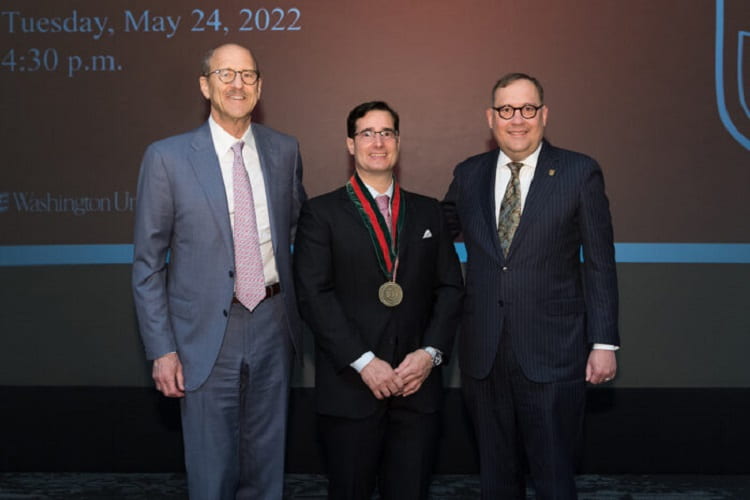Carlos Cruchaga, PhD, a pioneer in the use of human genomic data to understand and elucidate the biology of neurodegenerative diseases such as Alzheimer’s disease, has been named an inaugural Barbara Burton and Reuben M. Morriss III Professor at Washington University School of Medicine in St. Louis.
Cruchaga was installed by Chancellor Andrew D. Martin and David H. Perlmutter, MD, executive vice chancellor for medical affairs, the George and Carol Bauer Dean of the School of Medicine and the Spencer T. and Ann W. Olin Distinguished Professor.
The professorship was created through a bequest from the late Reuben M. Morriss III and Barbara Burton Morriss to Washington University, to advance Alzheimer’s disease research.
“The Morrisses were devoted members of the St. Louis community, and their investment in Washington University and specifically in Alzheimer’s research has created three endowed professorships bearing their names,” Martin said. “Through their generous gift to the university, they will continue to have a powerful impact on research and teaching at the university in perpetuity.”
Added Perlmutter: “We are deeply grateful to Barbara and Reuben Morriss for investing in Washington University and in our work to advance the understanding and treatment of Alzheimer’s disease. We look forward to future discoveries from the Cruchaga lab as Carlos combines complex technologies to identify genetic variants that may contribute to Alzheimer’s, Parkinson’s disease and other devastating disorders.”
Cruchaga’s research focuses on leveraging data from genetics, genomics and other omics and integrating that information with findings from neuroimaging and neuropathology to identify novel genes, biological pathways, molecular biomarkers and drug targets that may generate new approaches to diagnosing and treating neurodegenerative illnesses.
“Carlos came to Washington University as a postdoc to study the genetics of neurodegenerative illnesses,” said Charles F. Zorumski, MD, the Samuel Guze Professor and head of the Department of Psychiatry. “In 2014, Carlos became the leader of the genetics group at the Knight Alzheimer Disease Research Center (ADRC) and at the Hope Center for Neurological Disorders in the Department of Neurology. And last year he became the founding director of the Neurogenomics and Informatics Center, pioneering approaches to improve the understanding of causes and potential treatments for these devastating illnesses.”
